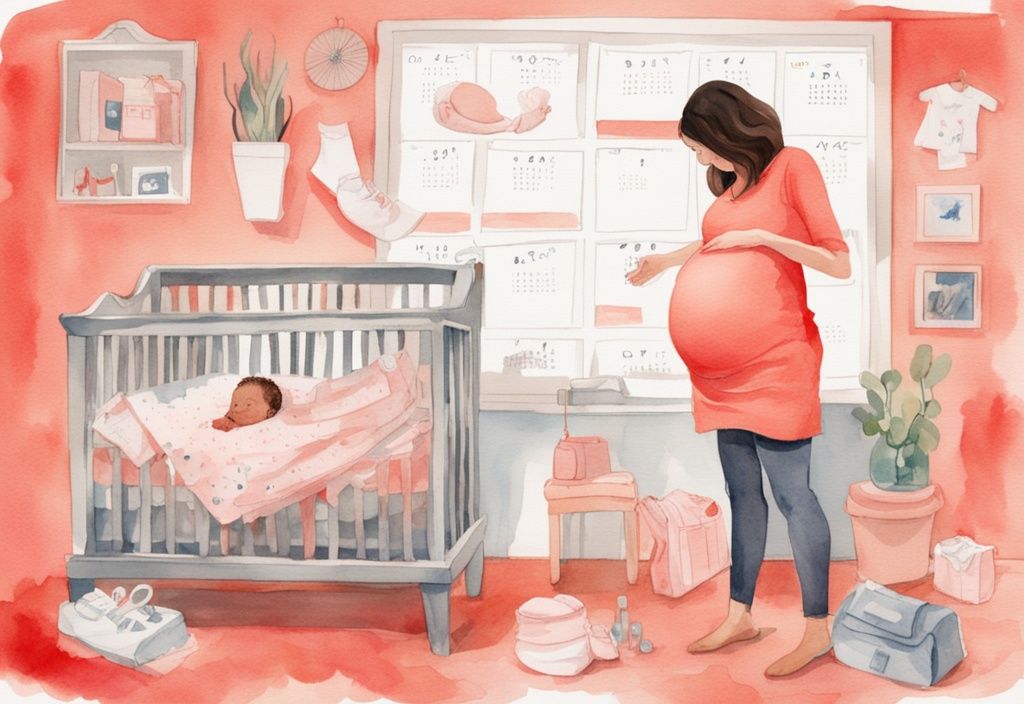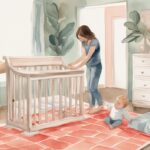Hi there, it’s Mia, fellow parent and seasoned baby-prep expert! You’re probably wondering when to start buying baby stuff, right? Believe me, I get it – planning for a new baby can feel like navigating a labyrinth of choices, finances, and timelines.
In this article, I’ll be your guide through the essentials of baby shopping. We’ll traverse the trimesters together, creating a comfortable nursery on a budget without overlooking anything important. From optimizing your baby shower gift list to capitalizing on sales and reward programs, I’ve got you covered.
Come along on this journey with me as we strategize cost-spreading, make informed decisions, and most importantly, ensure you’re ready for your little bundle of joy. Prepare to bid goodbye to stress and hello to sweet anticipation!
Why Starting Early Matters
Starting early on buying baby stuff provides so many wonderful benefits that can make your preparation experience more enjoyable and less stressful. One of the biggest advantages is having ample time to thoroughly research products and brands, so you can confidently make informed decisions. You also avoid the anxiety of rushed, last-minute purchases.
Financially, spreading out the costs over several months can help ease the financial burden, making it easier to manage your budget. Early planning can significantly reduce the stress as the due date approaches, giving you peace of mind. Plus, preparing in advance means you can systematically set up the nursery, ensuring everything is ready for your baby’s arrival.
Understanding Best Time to Shop for Baby Items
Determining when to start buying baby stuff depends on individual circumstances, but many parents find the second trimester to be ideal. After receiving a positive ultrasound report, there is both relief and excitement. Some parents, however, start shopping as early as 10-12 weeks, gradually accumulating essential items. There aren’t any hard and fast rules since the timing largely depends on personal preferences and unique situations. Early shopping not only brings peace of mind but also allows you to take advantage of seasonal sales and discounts, which can lead to significant savings.
Factors Influencing When to Start
Considerations Based on Trimesters
Each trimester offers different considerations for shopping:
In the first trimester, focus on budgeting and researching potential purchases. If you feel comfortable, you may start with a few essentials, though morning sickness and fatigue might limit your energy.
The second trimester is often preferred for more active shopping. Increased energy levels can make it easier to tackle big-ticket items like strollers, cribs, and nursery furniture. This is a great time to start setting up the nursery and deciding on a theme.
In the third trimester, it’s best to have the bulk of your shopping completed to avoid last-minute stress.
Focus on assembling essential items for both the baby and the hospital bag, ensuring all is ready for the big day.
Personal, Medical, and Financial Factors
Several additional factors can influence the timing of your baby shopping:
– **Personal Comfort and Readiness**: Your emotional and mental readiness to shop is crucial. Start when you feel comfortable and confident.
– **Medical Factors**: Healthcare provider recommendations can guide your shopping timeline, especially considering any medical conditions or complications.
– **Financial Situation**: Budget planning is key. Spreading out purchases can help manage expenses more effectively. Assess your financial readiness and create a baby budget to avoid overspending.
– **Family Support and Gifts**: Consider family support and potential gifts. Planning with these in mind can help avoid duplicate purchases and excessive spending.
By thoughtfully considering these factors, you can create a baby shopping plan that aligns with your unique circumstances and needs, ensuring a smoother and more enjoyable preparation journey. To further prepare emotionally for the changes ahead, you might find this guide helpful: https://www.nytimes.com/article/emotionally-prepare-for-parenthood-guide.html.
Creating a Smart Baby Shopping Plan
When planning for your baby, it’s crucial to know when to start buying baby stuff. A structured, phase-by-phase approach ensures you take the necessary steps without getting overwhelmed.
Essential Baby Items and When to Buy Them
First Trimester Essentials
During the first trimester, it’s essential to focus on budgeting and initial preparations rather than diving into extensive shopping. Start by creating a comprehensive baby registry to keep track of necessary items. Stockpiling household essentials like cleaning supplies and groceries can help reduce stress down the line.
Research baby gear to familiarize yourself with what’s needed, but limit actual purchases. Given that morning sickness and fatigue might hit hard, prioritize rest and small tasks. You’ll thank yourself later!
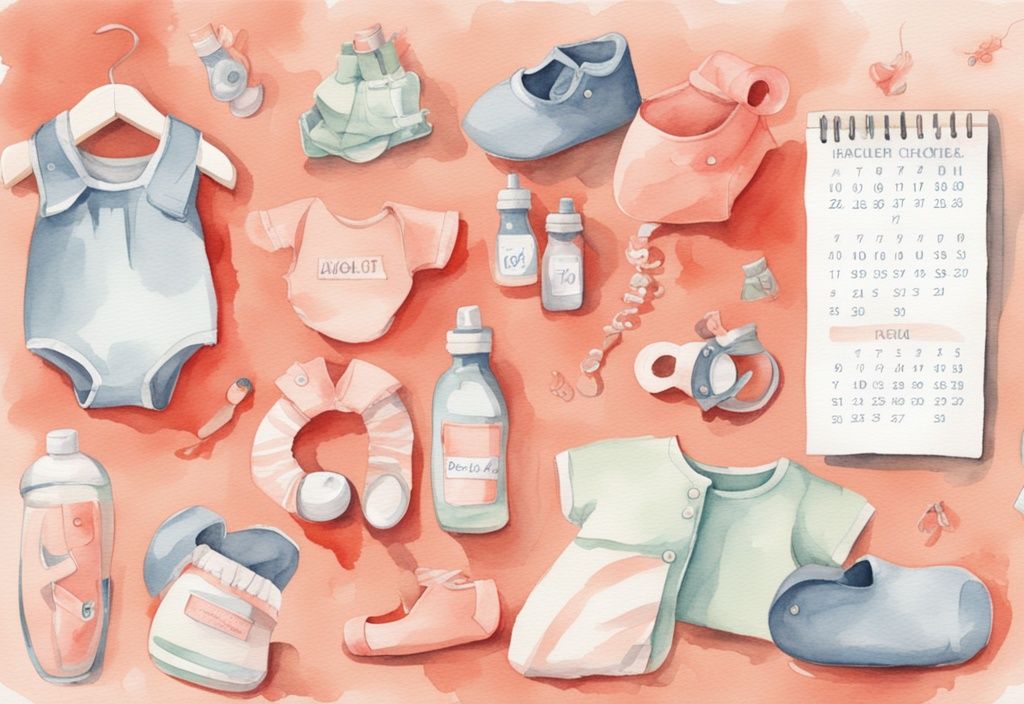
Second Trimester Essentials
The second trimester, typically marked by a surge in energy levels, is perfect for more active shopping. This is the best time to purchase big-ticket items such as strollers, cribs, and car seats. Begin setting up the nursery, choosing a theme, and buying essential feeding supplies and baby clothes.
Decluttering your home makes space for these new additions. By spreading out your purchases, you avoid overwhelming expenses and ensure a smoother transition into parenthood.
Third Trimester Essentials
As the due date approaches, focus on ensuring all essential baby items are ready. This includes baby clothes, diapers, and feeding supplies. Practice using the baby car seat, which is mandatory for hospital discharge.
Complete the baby’s wardrobe and address any last-minute purchases after the baby shower. Pre-wash baby clothes and items with baby-safe detergent to ensure they’re ready for immediate use upon your baby’s arrival.
Budgeting Tips for Baby Purchases
Assessing Your Financial Situation
Start by analyzing your current financial standing to understand what you can afford without stress. Create a detailed baby budget and stick to it to prevent overspending. Consider saving gradually over several months or making bulk purchases to take advantage of cost savings. Transparent financial planning can make this journey smoother and more enjoyable.
Using Rewards Programs and Deals
Maximize savings by signing up for mailing lists from baby product brands to receive exclusive discounts. Stay vigilant for deals and seasonal sales that offer significant discounts on necessary items. Utilize rewards programs, coupons, and sales to stretch your budget further without compromising on quality.
Setting up a Baby Registry
Creating a baby registry can significantly streamline the shopping process. It helps prevent duplicate purchases and ensures you receive essential items. Focus on practical and necessary items rather than trendy but less useful ones. Share your registry with family and friends to guide them in their gift-giving decisions, ensuring you get what you truly need.
By understanding when to start buying baby stuff and following a structured plan, parents can make informed, stress-free purchases and enjoy the excitement of preparing for their new arrival.
Effective Baby Shopping Strategies
Wait, Should I Hold off For Baby Showers and Gifts?
Waiting to see what gifts you receive at your baby shower can be a strategic move. Typically, loved ones generously gift a variety of baby essentials, easing your investment burden. If you do not have a baby shower, consider accepting hand-me-downs from other parents. This approach minimizes initial expenses, avoids duplicates, and ensures you receive useful items that others have found essential.
Buying Gender-Neutral vs. Gender-Specific Items
Many expectant parents opt to wait until the 20-week ultrasound to purchase gender-specific items. However, choosing gender-neutral items can be beneficial if you prefer to start preparing earlier or if you decide not to find out the baby’s gender. Gender-neutral items offer a timeless and versatile solution, ensuring that they can be used for any future children, regardless of gender. This approach also simplifies hand-me-downs among siblings and friends.
Space Considerations: What Fits in Your Home?
Before purchasing large baby items, it is crucial to assess the available space within your home. Gradually decluttering and organizing your home can make room for essential baby items. Opt for compact and multi-functional furniture, such as cribs that convert into toddler beds or changing tables that double as storage units. These choices will help maximize space efficiency and ensure a comfortable living environment for your growing family.
Cloth or Disposable Diapers: What’s Best?
Choosing between cloth and disposable diapers involves considering environmental impact, cost-effectiveness, and convenience. Cloth diapers are eco-friendly and can be more economical in the long run, but they require frequent washing. Disposable diapers offer convenience, especially for busy or traveling parents, but can be more costly over time. To determine which option suits your lifestyle and budget, buy small quantities of both and test their practicality before making a bulk purchase.
—
Effective Baby Shopping Strategies
Wait, Should I Hold off For Baby Showers and Gifts?
Waiting to see what gifts you receive at your baby shower can be a strategic move. Typically, loved ones generously gift a variety of baby essentials, easing your investment burden. If you do not have a baby shower, consider accepting hand-me-downs from other parents. This approach minimizes initial expenses, avoids duplicates, and ensures you receive useful items that others have found essential.
Buying Gender-Neutral vs. Gender-Specific Items
Many expectant parents opt to wait until the 20-week ultrasound to purchase gender-specific items. However, choosing gender-neutral items can be beneficial if you prefer to start preparing earlier or if you decide not to find out the baby’s gender. Gender-neutral items offer a timeless and versatile solution, ensuring that they can be used for any future children, regardless of gender. This approach also simplifies hand-me-downs among siblings and friends.
Space Considerations: What Fits in Your Home?
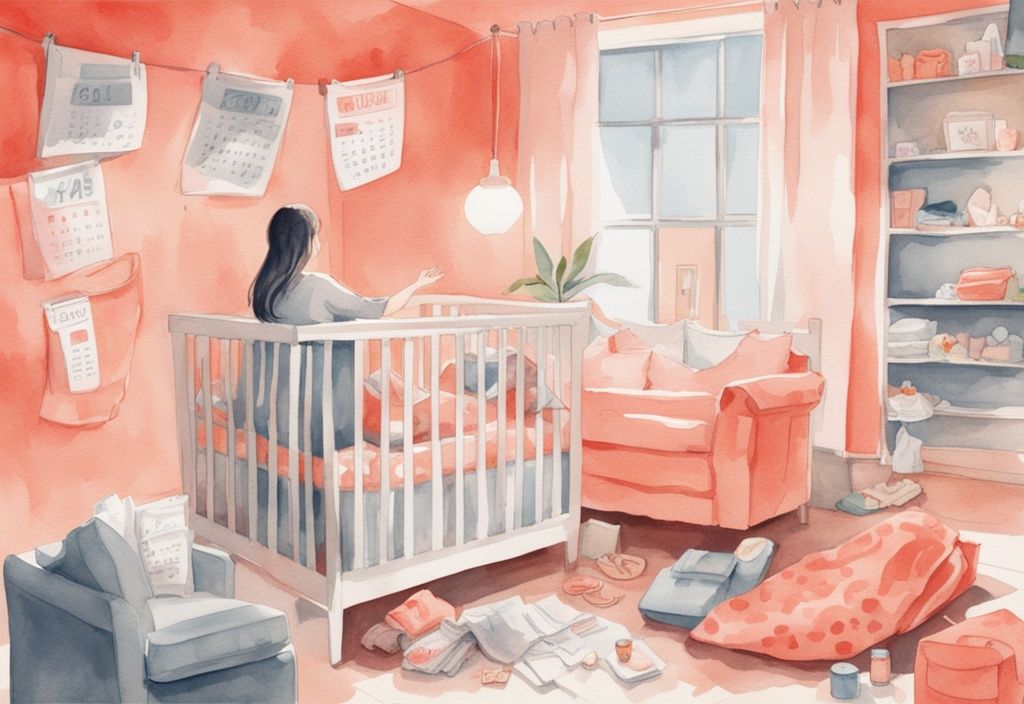
Before purchasing large baby items, it is crucial to assess the available space within your home. Gradually decluttering and organizing your home can make room for essential baby items. Opt for compact and multi-functional furniture, such as cribs that convert into toddler beds or changing tables that double as storage units. These choices will help maximize space efficiency and ensure a comfortable living environment for your growing family.
Cloth or Disposable Diapers: What’s Best?
Choosing between cloth and disposable diapers involves considering environmental impact, cost-effectiveness, and convenience. Cloth diapers are eco-friendly and can be more economical in the long run, but they require frequent washing. Disposable diapers offer convenience, especially for busy or traveling parents, but can be more costly over time. To determine which option suits your lifestyle and budget, buy small quantities of both and test their practicality before making a bulk purchase.
Considerations for Online Shopping and Delivery Times
When determining when to start buying baby stuff, consider several key factors to streamline your shopping and ensure everything arrives on time.
Managing Package Delivery Schedules
When you start buying baby stuff, it’s absolutely vital to manage package delivery schedules effectively. Think ahead and account for delivery times to ensure all the essential items arrive before your baby’s birth. This foresight can prevent unnecessary stress and help you accommodate any unforeseen shipping delays.
Ordering essentials well in advance can also help you avoid stock shortages, particularly for high-demand products. It’s always a good idea to be prepared rather than scrambling at the last minute.
Tracking your orders is another key step. Utilize various tools and apps to monitor the shipping status of your purchases. This not only helps you stay organized but also ensures a smooth and systematic preparation process.
Efficiently managing delivery schedules can make your transition into parenthood far smoother and a lot less stressful.
Score Big with Sales and Discounts
Maximizing your budget involves strategically timing your purchases to coincide with sales and discounts. One effective approach is to monitor sales and grab non-urgent items during promotional periods. This strategy allows you to spread out your expenditures and capitalize on price drops.
Signing up for alerts from your favorite baby brands is another excellent way to stay informed about upcoming deals. Brands often notify subscribers about exclusive discounts and limited-time offers, providing a chance to save significantly.
Additionally, plan your big purchases around major sale events like Black Friday, Cyber Monday, or other holiday sales. By doing so, you can often find considerable savings on big-ticket items. Not only does this make your shopping smarter, but it’s also an economical way to handle when to start buying baby stuff.
Setting Up a Cozy Nursery
Creating a cozy and functional nursery is one of the most thrilling projects for expecting parents. It’s crucial to start early, giving yourself plenty of time to build a safe haven for your little one. Wondering when to start buying baby stuff and what’s really essential? Let’s dive in! You’ll get the lowdown on the must-have items and the best times to start shopping.
Essential Nursery Items
Crib, Mattress, and Bedding: The crib is the centerpiece of any nursery. It’s vital to pick one that meets the latest safety standards. I’d recommend starting your crib and mattress shopping by the second trimester, allowing enough time for comparisons and setup. Go for a firm mattress, and make sure all bedding is snug and safe. Remember, no pillows, stuffed animals, or heavy blankets in the crib to minimize the risk of SIDS.
Storage Solutions: As your baby’s arrival nears, getting a head start on storage solutions can save lots of last-minute stress. Dressers, shelves, and bins are key for organizing baby clothes, toys, and supplies. Look for furniture that grows with your child, offering both longevity and value.
Comfortable Chair: A cozy chair is a must for feeding and quality cuddling time. When it comes to when to start buying baby stuff like a nursing chair, begin in your second trimester when you’re full of energy. Test out various chairs to find one that offers great back support and is easy to get out of while holding a sleeping baby.
Baby Monitor: A dependable baby monitor gives peace of mind, letting you keep an eye or ear on your baby from another room. Start your research and purchase by the second trimester. Choose between audio, video, or smart monitoring options based on your preferences and home setup.
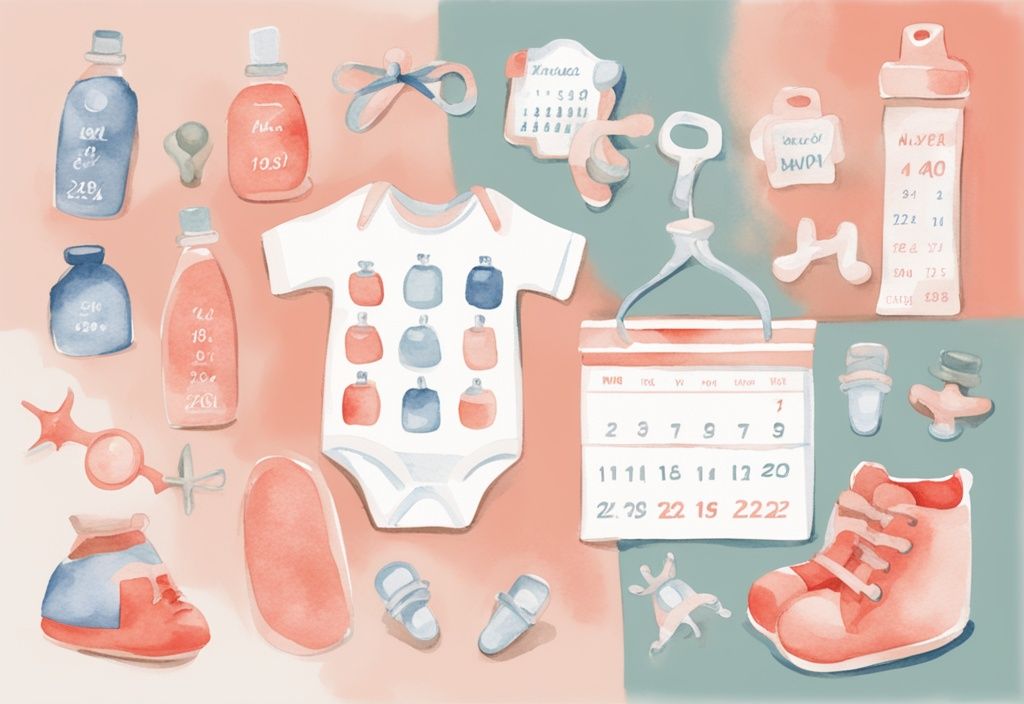
Changing Table: Having a dedicated changing station can make diaper-duty so much easier. Getting your changing table ready by the second trimester ensures you’re all set before the baby arrives. Opt for a stable table with plenty of storage for diapers, wipes, and creams.
Essential Decor Items: Add that special touch to make the nursery feel warm and welcoming. Whether it’s artwork, wall decals, or a cozy rug, start gathering and setting up these decor items in the latter part of your second trimester. This way, you have time for personal touches without the rush.
In conclusion, deciding when to start buying baby stuff for your nursery largely depends on your pregnancy timeline and personal preferences. By beginning to plan and collect your essential nursery items in the second trimester, you can ensure everything is ready well before your baby’s arrival. This approach helps create a well-prepared, cozy space to welcome your new addition to the family.
Safety First: Ensuring Safe Baby Products
When considering when to start buying baby stuff, safety should be your top priority. Ensuring that key items are new and adhere to the highest safety standards is essential for your baby’s well-being.
Items to Always Buy New
Car Seats: Ensuring your baby’s safety during travel is paramount. Always buy car seats new to benefit from the latest safety features and regulations. Car seats have expiration dates, and using an expired or previously used seat might compromise its safety integrity in case of an accident.
Cribs: New cribs follow the latest safety regulations, reducing the risk of accidents. Older or secondhand cribs might not meet current standards and could have wear and tear that jeopardizes their stability. Providing a safe sleeping environment for your baby is crucial.
Items Harboring Bacteria or Worn Safety Mechanisms: Products such as mattresses, feeding bottles, and breast pumps should always be new. Used items can harbor bacteria or germs that pose health risks to your baby. Additionally, mechanical parts in items like breast pumps can wear out, reducing their effectiveness and safety. Investing in new items ensures your baby’s health and optimal functionality.
Each of these items plays a vital role in your baby’s safety and comfort. As you plan and decide when to start buying baby stuff, ensuring that key items are purchased new will provide peace of mind and the safest environment for your little one.
FAQ: Quick Answers to Your Key Concerns
Best Time to Start Buying Baby Stuff
When to start buying baby stuff? Ah, that’s a question many expectant parents ponder. Typically, the optimal time to dive into baby shopping is by the end of the first trimester or the beginning of the second trimester. This timeframe provides a sweet spot that blends anticipation and preparation. But, remember, darling, this timing should dance around your personal comfort, medical advice, and, of course, your financial readiness.
Key First Purchases for a New Baby
Your initial shopping list should become your best friend. Start with the essentials: a cozy car seat, a snug crib, a reliable stroller, soft basic clothing, lots of diapers, and those much-needed feeding supplies. And don’t overlook the nitty-gritty hygiene products! Baby-safe detergent, gentle soap, and baby wipes are just as crucial. These items ensure you’re equipped to welcome your little one with open, prepared arms.
Is it Safe to Buy Secondhand Baby Items?
Venturing into secondhand territory can be a savvy way to save some pennies. Clothing, toys, books, and furniture are generally safe to buy secondhand. However, be cautious with car seats, cribs, and mattresses due to safety and hygiene concerns. Always ensure that secondhand items are spotless and in stellar condition before bringing them into your home.
Should I Wait for the Baby Shower?
Waiting for the baby shower can be a smart move to avoid unnecessary expenses and duplicate items. Use the gifts from the shower as a guide to complete your shopping list. This way, you can stretch your budget further while ensuring your baby has everything they need.
How to Save Money While Shopping for Baby Items
To save those valuable dollars, take advantage of rewards programs and sign up for discounts and promotional alerts. Timing your purchases during sales and seasonal discounts can also provide significant savings. Embrace hand-me-downs and create a comprehensive baby registry to guide generous gifts from friends and family. Remember, it’s all about maximizing your resources to give your baby the best start.
